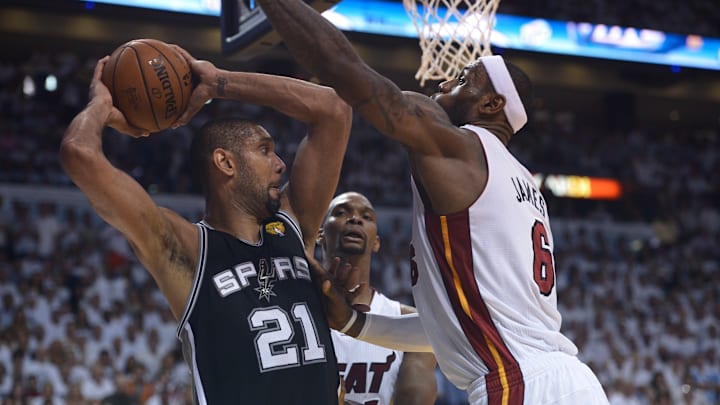It's now been over eight years since the San Antonio Spurs suffered one of the most gut-wrenching defeats in sports history. Still, fans are reminded of that fateful night often all over social media and television.
Sorry for being the culprit this time, but this needs to be said: everyone blaming Gregg Popovich for the turn of events that led to Ray Allen's dagger 3-pointer needs a reality check. The take has been and always will be lazy, ill-informed, and tired.
The idea to address this came to me after I saw a comment on a tweet I made about the fiesta jerseys from the past two years:
The franchises’ second-worst decision ever after pulling Duncan in Game 6 was getting rid of the blacks from last year. Open to the argument that it might be the worst decision. https://t.co/met2Bkvefr
— Casey Viera (@Casey_Viera) April 19, 2022
Now I'm sure most or all of this was Casey just being facetious. Or not -- I can't know his intent for sure. Nevertheless, there are certain circles of Spurs fans and NBA fans that seem to believe that the Game 6 loss was the direct result of one singular decision by Popovich. That's just not how basketball works.
I hate to do this to you, but if you need a refresher of how the shot that sank the Spurs played out, here you go.
Clearly, the biggest play other than Ray Allen burying that cold-blooded corner three was Chris Bosh securing the offensive rebound to even make the shot possible. The question that's constantly been asked since the second that shot went in has been 'why wasn't Tim Duncan on the floor'? Surely, one of the greatest rebounders in league history would've secured that board -- and thus, the championship -- right?
Well, let's first start there. Yes, there's a great chance Tim would've been boxing out Bosh if he was on the floor and that exactly play would've been drawn up by the Miami Heat. At the same time, having Duncan on defense while you're down three with five shooters on the floor creates different opportunities.
The play would've looked entirely different -- although I'm pretty sure it'd still end up with a 3-point attempt by James or Allen. Either way, offensive rebounds are frequently the result of how the ball bounces, just like all aspects of basketball.
"On an offensive rebound, it’s one of the toughest things in the NBA, to pick up people," said Popovich after the game. "We had one guy who didn’t pick up. LeBron shot an airball when we were up by five. They got the rebound, they got it back to him and he knocked it down."
Even when watching how it all played out, just imagine LeBron's shot veering left a little bit -- then it lands in the hands of Kawhi Leonard or Boris Diaw and the whole thing is probably a wrap. I say probably because, well, Leonard had just missed a free throw that would've made Miami's deficit four points with 19 seconds remaining instead of three. He or anyone else could've missed another or both on an ensuing foul.

Placing blame on one decision is extremely short-sighted
“It’s not that simple,” Popovich said in the same above article. “That’s not why they got the threes. We were up five when they got their first three, so switching makes sense just to take away the three."
Of course, Pop was addressing criticism for leaving his Hall of Fame power forward off the floor in the guts of the game. In reality, it was something he's frequently done to great success over the years when San Antonio was up by three points.
After all, Tim isn't a perimeter defender. In hindsight, it's easy to look at a play that turns out this way and point to his absence as a factor, and it was. But placing sole blame on a coach for making a decision that has worked countless times in the past is short-sighted and extremely "Monday morning quarterback" of everyone that does it.
Both Manu Ginobili and Kawhi Leonard each missed a free throw in the final 28 seconds of the game that would've pushed the lead to more than the three points it was in the guts of the game. I don't often hear them being blamed for the collapse because, well, missed free throws are part of the game. So are offensive rebounds.
The bottom line is people like to react after the fact to events instead of with logic or reason. What if Kawhi had blocked LeBron's three? Better yet, what if Boris Diaw, who'd just subbed in for Duncan, had drawn a title-clinching charge? Just like that, the narrative shifts to Coach Popovich being a genius by leaving Tim on the sidelines.
Beyond all of this ridiculousness, there's still the fact that the 2014 Spurs' title, easily the most satisfying of the bunch, never would've happened without 2013. So a bigger question to ask when all of this is brought up again is who really cares why things played out how they did?
In the end, one of the greatest shooters in NBA history burned the Spurs thanks to help from a couple of other Hall of Famers. That happens in the league. Tremendous players make tremendous plays, and what happened will always have happened no matter who people try to force blame on.
